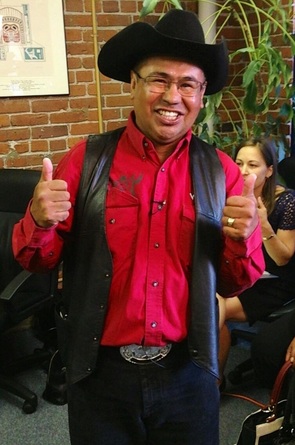Canada Aboriginals score huge win in land title court case
 Chief Roger Williams upon hearing the verdict Chief Roger Williams upon hearing the verdict
B.C. Justice Minister Suzanne Anton said the decision provided “additional certainty around processes and tests that are
applied to the relationship between the province and Aboriginal peoples. OTTAWA –The Supreme Court of Canada has granted a declaration of Aboriginal title to the Tsilhqot’in over 1,087 square miles of territory in a historic ruling handed down on June 26. This is the first time the high court has ever granted a declaration of Aboriginal title to a First Nations people. The ruling also acknowledges indigenous nations can claim occupancy and control over vast swaths of land beyond specific settlement sites, provides more clarity on Aboriginal title and sets out the parameters for government “incursion” into land under Aboriginal title. The ruling also hands a final victory to the Tsilhqot’in Nation—which encompasses six communities with a population of about 3,000 people throughout British Columbia—in a long-running battle, including blockades, over logging permits in their claimed territory. “I would allow the appeal and grant a declaration of Aboriginal title over the area at issue, as requested by the Tsilhqot’in,” said the unanimous ruling, written by Chief Justice Beverley McLachlin. “I further declare that British Columbia breached its duty to consult owed to the Tsilhqot’in through its land-use planning and forestry authorization.” British Columbia and Ottawa both opposed the Tsilhqot’in claim to title. The Supreme Court blasted the British Columbia Court of Appeal, which had overturned a lower court ruling on what territory the Tsilhqot’in could claim under Aboriginal title. The high court found the B.C. Court of Appeal’s definition of occupancy too narrow. “There is no suggestion in the jurisprudence or scholarship that Aboriginal title is confined to specific village sites or farms, as the Court of Appeal held,” said the ruling. “Rather, a culturally sensitive approach suggests that regular use of territories for hunting, fishing, trapping and foraging is “sufficient” use to ground Aboriginal title.” The high court said that Aboriginal title could be declared over territory “over which the group exercised effective control at the time of assertion of European sovereignty.” Tsilhqot’in Nation Tribal Chair Joe Alphonse called the ruling “amazing” and said it marked the beginning of a “new Canada.” More Information: 
If you like this story, please consider taking out a gift-based subscription.
|
|





